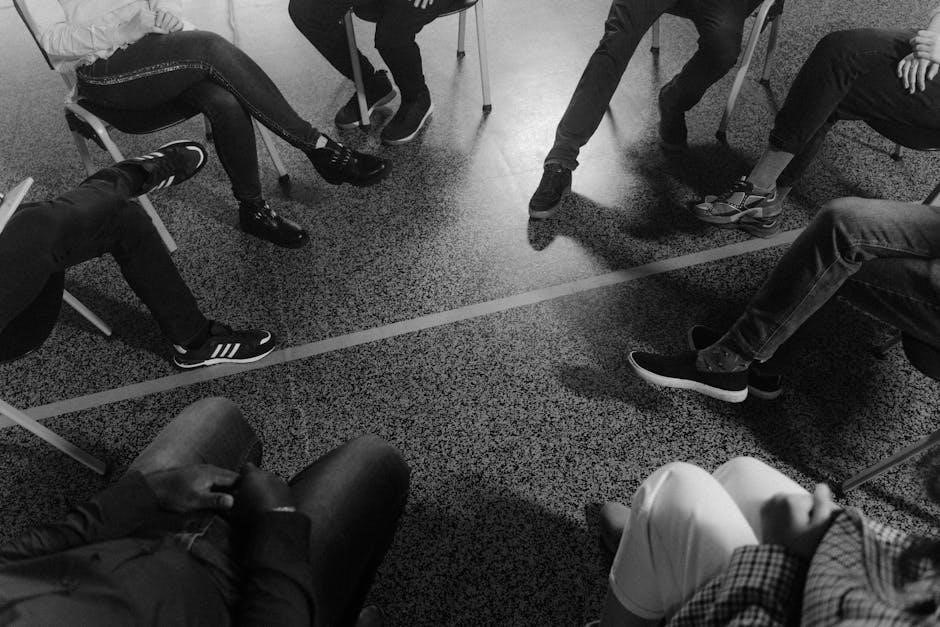This PDF provides engaging trivia questions and answers focused on recovery topics‚ offering an interactive way to explore substance use‚ mental health‚ and skill-building in group therapy settings.
Overview of the Importance of Trivia in Recovery
Trivia plays a dynamic role in recovery by fostering engagement‚ sparking meaningful conversations‚ and reinforcing key concepts. It creates a relaxed environment where participants can learn about recovery topics‚ share experiences‚ and reflect on their journeys. Interactive trivia games not only educate but also encourage teamwork and camaraderie‚ making the recovery process more enjoyable and accessible. This approach helps individuals stay motivated‚ retain information‚ and build confidence in their understanding of recovery principles.
How Trivia Questions Can Enhance Engagement in Group Therapy
Trivia questions add an interactive and fun element to group therapy‚ breaking the ice and encouraging active participation. They help individuals connect by sharing knowledge and experiences‚ fostering a sense of camaraderie. Engaging with trivia stimulates critical thinking and reflection‚ making complex recovery concepts more relatable. This approach also helps participants stay focused and motivated‚ creating a supportive environment where learning is both enjoyable and impactful for personal growth and understanding of recovery strategies.

Types of Substance Abuse Treatment/Support Groups
Explore various substance abuse treatment/support groups‚ including 12-Step Programs‚ SMART Recovery‚ and support groups using interactive activities like trivia games to foster engagement and community.
12-Step Programs and Their Role in Recovery
12-Step programs‚ like Alcoholics Anonymous (AA) and Narcotics Anonymous (NA)‚ provide a structured‚ peer-supported approach to recovery. These programs emphasize anonymity‚ shared experiences‚ and a spiritual foundation. Key steps include admitting powerlessness‚ surrendering to a higher power‚ and taking a moral inventory. The 12-Step framework fosters accountability‚ personal growth‚ and long-term sobriety. Trivia questions about these programs can educate participants on their principles and benefits‚ encouraging engagement and deeper understanding of their role in the recovery journey.
SMART Recovery and Other Non-12-Step Approaches
SMART Recovery is a non-12-step program focusing on self-empowerment and evidence-based techniques. It uses tools like the ABCs of REBT and the Change Plan Worksheet to help individuals manage cravings and build motivation. Unlike 12-step programs‚ SMART emphasizes self-reliance and scientific approaches‚ making it a popular alternative for those seeking secular recovery methods.
Other non-12-step approaches include therapy-based models and peer support groups like Secular Organizations for Sobriety (SOS). These programs often incorporate cognitive-behavioral techniques and focus on personal goal-setting‚ providing diverse options for individuals in recovery.

The Role of Triggers in Recovery
Triggers‚ such as people‚ places‚ or emotions‚ can provoke cravings and relapse. Understanding and managing triggers is crucial for maintaining sobriety and long-term recovery success.
Common Triggers for Substance Use
Common triggers for substance use include stress‚ certain people‚ places‚ or emotions. Anniversaries of traumatic events‚ social pressures‚ and exposure to substances can also trigger cravings. Negative emotions like anxiety or depression often play a role. Identifying these triggers is essential for developing effective coping strategies to avoid relapse and maintain sobriety in recovery.
Coping Strategies to Manage Triggers
Effective coping strategies for managing triggers include deep breathing‚ mindfulness‚ and journaling to process emotions. Reaching out to sponsors or support groups can provide encouragement and accountability. Engaging in healthy activities like exercise or creative hobbies helps distract and reduce cravings; Developing a relapse prevention plan and identifying safe environments are also key. These strategies empower individuals to stay proactive and resilient‚ fostering long-term sobriety and emotional well-being.

The Serenity Prayer in Recovery
The Serenity Prayer‚ “God grant me the serenity to accept things I cannot change‚” is a cornerstone in recovery‚ offering wisdom and resilience for daily challenges.
Understanding the Serenity Prayer
The Serenity Prayer‚ a cornerstone in recovery‚ reads: “God grant me the serenity to accept things I cannot change‚ the courage to change the things I can‚ and the wisdom to know the difference.” It emphasizes acceptance‚ courage‚ and wisdom‚ guiding individuals to focus on what they can control. This prayer is widely used in 12-step programs and recovery groups‚ helping participants navigate challenges with grace and resilience. Its timeless message promotes inner peace and clarity in daily life.
Applying the Serenity Prayer in Daily Life
The Serenity Prayer encourages individuals to embrace acceptance‚ courage‚ and wisdom in their daily lives. By focusing on what they can change‚ letting go of what they cannot‚ and seeking clarity in decision-making‚ individuals can cultivate resilience. This prayer helps individuals navigate life’s challenges with grace‚ fostering personal growth and emotional balance. Its principles are timeless‚ offering guidance for moments of uncertainty and strengthening one’s ability to adapt to life’s ever-changing circumstances.
Motivation‚ Willpower‚ and Willingness in Recovery
Motivation sparks initial efforts‚ willpower sustains progress‚ and willingness fosters openness to change‚ each playing a vital role in overcoming challenges and achieving lasting recovery success.
Which is Most Important and Why
Motivation‚ willpower‚ and willingness are all crucial in recovery‚ but willingness is most important. It opens the door to change‚ allowing motivation and willpower to take root. Without willingness‚ even strong motivation or willpower may falter. Willingness creates a mindset that accepts challenges and embraces growth‚ making it the foundation for lasting progress in recovery. It fosters resilience and adaptability‚ essential for overcoming setbacks and maintaining long-term sobriety.
Favorite Phrases and Sayings in Recovery
Recovery often embraces meaningful phrases that inspire and motivate individuals. Common sayings include “Clean and proud!” and “I’ve come a long way!” These phrases celebrate progress and resilience. The Serenity Prayer‚ with lines like “God grant me the serenity…” and “Take what you need and leave the rest‚” is widely used. Such sayings provide comfort‚ focus‚ and hope‚ serving as reminders of the strength gained through the recovery journey. They foster unity and positivity within support groups.

Relapse Prevention and Recovery
Relapse prevention is a critical aspect of recovery‚ involving strategies to identify triggers and create actionable plans to avoid setbacks‚ ensuring long-term sobriety and personal growth.
Does Relapse Have to Be Part of Recovery?
Relapse is not a required part of recovery but can be a common experience for many. It often stems from unaddressed triggers or stress‚ highlighting the need for stronger coping strategies. While relapse can provide valuable lessons‚ it doesn’t define one’s journey. Many achieve long-term sobriety without relapsing‚ proving recovery is unique to each individual. Understanding triggers and creating a relapse prevention plan can significantly reduce the likelihood of setbacks‚ helping individuals stay focused on their growth and goals.
Creating a Relapse Prevention Plan
A relapse prevention plan is a personalized strategy to identify triggers‚ develop coping mechanisms‚ and maintain sobriety. It includes listing high-risk situations‚ healthy recreational activities‚ and emergency contacts. Reflecting on past behaviors helps anticipate challenges‚ while tracking progress reinforces commitment. The plan should be regularly updated to adapt to changing needs‚ ensuring long-term recovery. By addressing physical‚ emotional‚ and mental well-being‚ individuals can build resilience and stay focused on their goals.

Reflection Questions for Recovery
Reflection questions help individuals explore their recovery journey‚ examining personal growth‚ challenges‚ and successes; They encourage deep self-reflection‚ fostering insights and strengthening one’s path forward in recovery.
How Have I Grown Stronger Through Recovery?
Reflecting on your recovery journey helps identify personal growth and strengths. Consider how your mindset‚ behaviors‚ and relationships have improved since starting recovery. Think about challenges overcome‚ healthier coping strategies adopted‚ and positive changes in self-care. Acknowledge achievements‚ no matter how small‚ to build confidence and motivation. This reflection fosters self-awareness‚ helping you recognize progress and stay committed to your journey. Celebrate the person you’ve become and the resilience you’ve developed‚ which are key to long-term success in recovery.
Exploring Personal Growth and Change
Recovery fosters personal growth by helping individuals develop self-awareness‚ resilience‚ and healthier habits. Through reflection‚ people can identify positive changes in their thoughts‚ behaviors‚ and relationships. This journey encourages embracing new perspectives and skills‚ such as improved communication and emotional regulation. By acknowledging progress and challenges‚ individuals can celebrate their transformation and build confidence. Personal growth in recovery is a dynamic process that enhances overall well-being and empowers individuals to lead fulfilling lives. It’s a testament to their strength and commitment to change.

Emergency Kits for Recovery
An emergency kit for recovery includes essential resources like 12-step program information‚ important phone numbers‚ and healthy recreational activities to help individuals stay on track during challenging times.
What Should Be Included in a Recovery Emergency Kit
A recovery emergency kit should include essential items like 12-step program information‚ important phone numbers‚ coping strategies‚ and healthy recreational activities. It may also contain motivational quotes‚ a list of support contacts‚ and personal items that bring comfort‚ such as photos or a recovery journal. These resources help individuals stay grounded and focused on their recovery journey‚ especially during challenging moments.
Healthy Recreational Activities for Recovery
Healthy recreational activities for recovery include exercises like yoga‚ walking‚ or sports to promote physical and mental well-being. Creative pursuits such as art‚ music‚ or journaling can foster self-expression and emotional healing. Social activities like group outings or hobbies with peers encourage connection and accountability. Mindfulness practices‚ such as meditation or spending time in nature‚ help reduce stress and improve focus. These activities provide healthy distractions‚ build confidence‚ and support long-term recovery by replacing negative habits with positive‚ fulfilling experiences.

Stages of Change in Recovery
The stages of change model outlines pre-contemplation‚ contemplation‚ preparation‚ action‚ maintenance‚ and termination. Understanding these phases helps individuals and counselors track progress and tailor recovery strategies effectively.
Understanding the Stages of Change Model
The Stages of Change Model‚ also known as the Transtheoretical Model‚ outlines six distinct phases: pre-contemplation‚ contemplation‚ preparation‚ action‚ maintenance‚ and termination. This framework helps individuals understand their readiness to change behaviors‚ particularly in recovery. Each stage represents a progression toward sustainable change‚ allowing individuals and counselors to identify where someone is in their journey and tailor strategies accordingly. This model is widely used in recovery settings to track progress and provide targeted support for long-term success.
Identifying Your Current Stage of Change
Identifying your current stage of change involves self-reflection and awareness of your readiness to modify behaviors. The Transtheoretical Model outlines six stages: pre-contemplation‚ contemplation‚ preparation‚ action‚ maintenance‚ and termination. Recovery trivia questions and answers can help individuals recognize where they stand by exploring thoughts‚ feelings‚ and actions. Reflection questions encourage honest assessment‚ enabling personalized strategies to move forward. Understanding your stage fosters accountability and guides meaningful progress in recovery.

Recovery Trivia Games and Activities
Recovery trivia games offer interactive and engaging ways to reinforce learning‚ fostering collaboration and fun. Activities like beach ball trivia encourage participation‚ making recovery education enjoyable and impactful.
Using a Beach Ball for Interactive Trivia
Using a beach ball for interactive trivia is a fun and engaging way to involve participants in recovery discussions. Simply write numbers on the ball‚ each corresponding to a trivia question. Toss the ball to participants‚ who must answer the question associated with the number they catch. This activity promotes teamwork‚ breaks the ice‚ and makes learning about recovery topics enjoyable and accessible. It’s a creative way to keep groups focused and motivated during therapy sessions or support meetings.
Hosting a Recovery Trivia Game
Hosting a recovery trivia game is an engaging way to enhance group therapy sessions. Use the recovery trivia questions and answers PDF‚ which includes 61 questions on substance use‚ mental health recovery‚ and skill-building. Organize the game in a structured manner‚ allowing participants to engage either individually or in teams. Encourage interaction by incorporating activities like tossing a numbered beach ball to select questions. This approach fosters camaraderie and makes learning about recovery enjoyable. Keep the atmosphere light and supportive to ensure active participation and meaningful discussions.
